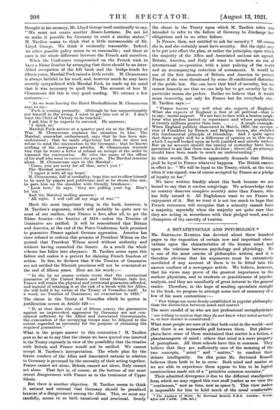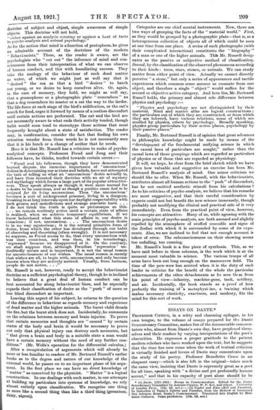A METAPHYSICIAN AND PSYCHOLOGY.* Mn. BERTRAND RUSSELL has devoted about
three hundred pages to the exposition of certain new and important obser- vations upon the characteristics of the human mind and upon the relations between psychology and physiology. He is one of the most concise of philosophic writers, and it is therefore obvious that his arguments must be extensively mutilated if any account of them is to be fitted into the narrow confines of a newspaper article. We believe, however, that his views may prove of the greatest importance to the modem physicists, and to students or practitioners of psycho- analysis, and they are manifestly of great interest to the general reader. Therefore, in the hope of sending specialists straight to the book, we propose to attempt some sort of summary of few of his main contentions :— " Few things are more firmly established in popular philosophy than the distinction between mind and matter."
The more candid of us who are not professional metaphysicians " are willing to confess that they do not know what mind actually is, or how matter is constituted."
What most people are sure of is that both exist in the world—and .that there is an impassable gulf between them. But philoso- phers have some of them maintained that matter is a fiction, a phantasmagoria of mind ; others that mind is a mere property of protoplasm. All three schools have this in common. They believe that they are sufficiently sure of the meaning of the two concepts, " mind " and " matter," to conduct their debate intelligently. On this point Mr. Bertrand Russell believes them both to be in error. Both mind and matter as we are able to experience them appear to him to be logical constructions made out of a " primitive common ancestor."
Their admitted divergence is due to the different standpoints from which we may regard this root stuff (rather as we view the "continuum," now as time, now as space ?). This view makes it impossible for him to hold much of the usual comfortable
• The Analysis of Mind. By Bertrand Busse% FILL London: George Alien and Unwin. [161. set.]
doctrine of subject and object, simple awareness of simple objects. This doctrine will not hold, "either against an analytic scrutiny or against a host of facts in psycho-analysis and animal psychology."
As for the notion that mind is a function of protoplasm, he gives an admirable account of the doctrines of the modern Behaviourists." These, as the reader is aware, are the psychologists who " cut out " the inference of mind and con- sciousness from their interpretation of what we can observe of human conduct, and this with humiliating success. They take the analogy of the behaviour of such dead matter as water, of which we might just as well say that it " desired " the sea as that a bird " desires " to hatch out young, or we desire to keep ourselves alive. Or, again, in the case of memory, they hold, we might as well say, that a gramophone or a photographic plate " remembers " as that a dog remembers its master or a cat the way to the larder.
The life-force at each stage of the bird's nidification, or the cat's search for food, urges it forward by means of a restless discomfort until certain actions are performed. The cat and the bird are not necessarily aware to what ends their activity tended, though habit would soon tend to stereotype those actions that most frequently brought about a state of satisfaction. The reader may, in confirmation, consider the fact that finding his own attention wander from these words he is not necessarily sure that it is his lunch or a change of author that he needs. Here it is that Mr. Russell has a criticism to make of psycho- analytical concepts. Professors Freud and Jung and their followers have, he thinks, tended towards certain errors :-
" Freud and his followers, though they have demonstrated beyond dispute the immense importance of `unconscious' desires in determining our actions and beliefs, have not attempted the task of telling us what an uneonscious ' desire actually is, and have thus invested their doctrine with an air of mystery and mythology which forms a large part of its popular attractive- ness. They speak always as though it were more normal for a desire to be conscious, and as though a positive cause had to be assigned for its being unconscious. Thus the unconscious' becomes a sort of underground prisoner, living in a dungeon, breaking in at long intervals upon our daylight respectability with dark groans and maledictions and strange atavistic lusts. . . . I do not think the truth is quite so picturesque as this. . . . we remain restlessly active until a certain state of affairs is realized, when we achieve temporary equilibrium. If wo know beforehand what this state of affairs is, our desire is conscious ; if not, unconscious. . . . The unconscious desire is in no way mysterious ; it is the natural primitive form of desire, from which the other has developed through our habit of observing and theorizing (often wrongly). It is not necessary to suppose, as Freud seems to do, that every unconscious wish was once conscious, and was then, in his terminology, repressed' because we disapproved of it. On the contrary, we shall suppose that, although Freudian `repression' un- doubtedly occurs and is important, it is not the usual reason for unconsciousness of our wishes. The usual reason is merely that wishes are all, to begin with, unconscious, and only become known when they are actively noticed. Usually, from laziness, people do not notice, . .
Mr. Russell is not, however, ready to accept the behaviourist doctrine as a sufficient psychological theory, though he is inclined to believe that a great deal of human conduct can be best accounted for along behaviourist • lines, and he especially
regards their classification of desire as the " push " of more or less blind discomfort as important.
Leaving this aspect of his subject, he returns to the question of the difference in behaviour as regards memory and experience of dead matter and the higher animals. The burnt child dreads the fire, but the burnt stick does not. Incidentally, he comments on the relations between memory and brain injuries. To prove that certain memories and thoughts are " caused " by certain states of the body and brain it would be necessary to prove not only that physical injury can destroy such memories, but " that given a brain and body in a suitable state a man would have a certain memory without the need of any further con- ditions." (Mr. Wells's operation for • the differential calculus.)
After a recapitulation of arguments which will already be more or leas fimiliar to readers of Mr. Bertrand Russell's earlier books as to the degree and nature of our knowledge of the external world, he passes on to an important phase of his argu- ment. In the first place we can have no direct knowledge of
matter " as conceived by the physicist. " Matter " is a logical construction. In our dealings with such matter, in our attempts at building up particulars into systems of knowledge, we rely almost entirely upon classification. We recognize one thing as more like a second thing than like a third thing (geranium, daisy, Pigeon).
Categories are our chief mental instruments. Now, there are two ways of grouping the facts of the " material world." First, as they would be grouped by a photographic plate—that is, as a heterogeneous collection of objects all of which could be seen at one time from one place. A series of such photographs (with their complicated interactions) constitutes the " biography " of a man or one of the higher animals. This Mr. Russell desig- nates as the passive or subjective method of classification. Second, by the classification of the observed phenomena according
to their kinds : trees, stars, stones, or animals. We can study matter from either point of view. Actually we cannot directly perceive " a stone," but only a series of appearances and tactile experiences which common sense assures us emanate from ono object, and therefore a single " object" would suffice for the second or objective active category. And here lies, Mr. Bertrand Russell holds, the primary and almost sole difference between physics and psychology :-
"Physics and psychology are not distinguished by their material. Mind and matter alike are logical constructions ; the particulars out of which they are constructed, or from which they are inferred, have various relations, some of which are studied by physics, others by psychology. Broadly speaking, physics group particulars by their active places, psychology by their passive places."
Finally, Mr. Bertrand Russell is of opinion that great advances in philosophic knowledge might be made by means of the "development of the fundamental unifying science in which the causal laws of particulars are sought," rather than the causal laws of those groupings which are regarded as particulars of physics or of those that are regarded as physiology.
It will, we hope, be clear from the brief sketch which we have given how valuable and suggestive an exercise has been Mr.
Bertrand Russell's analysis of mind. One minor criticism we should like to offer. When Mr. Russell, with the behaviourists, attributes almost all human actions to the "push" of discomfort, has he not omitted aesthetic stimuli from his calculations ? As to his criticism of psycho-analysis, we believe that his remarks are most suggestive, and that their careful consideration by experts could not but benefit the new science immensely, though probably not modifying the clinical and practical side of it very
immediately. Even from the practical point of view, however, his concepts are attractive. Many of us, while agreeing with the
main principles of psycho-analysis, are both amused and slightly repelled by the atmosphere of stuffed crocodile and signs of the Zodiac with which it is surrounded by some of its expo- nents. Also, we are inclined to feel that not enough account is taken of error. The subconsciousness on their showing seems too unfailing, too cunning.
Mr. Russell's book is a fine piece of synthesis. This, as we have said before in these columns, is the work which is at the moment most valuable to science. The various troops of all arms have been out long enough on the manoeuvre field. The time of the pow-wow has arrived when it is the duty of each leader to criticize for the benefit of the whole the particular achievements of the other detachments as he sees them from his point of view—infantry, machine-guns, tank, artillery, and air. Incidentally, the book stands as a proof of how perfectly the training of `a metaphysHan, a training which makes necessary elasticity, exactness, and modesty, fits the mind for this sort of work.



































 Previous page
Previous page